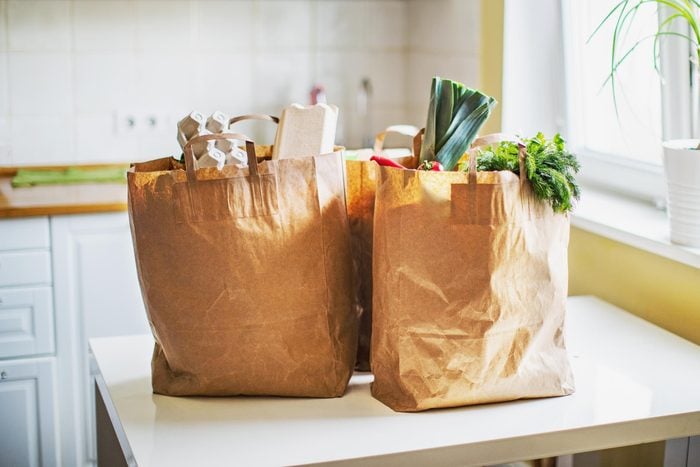
Why are grocery prices so high right now?
If you feel like your grocery runs are costing more lately, you’re not wrong. The U.S. Department of Agriculture (USDA) cited that at-home food prices (meaning, nonrestaurant spending) increased 12.4% between October 2021 and October 2022, thanks, in part, to continued inflation and supply chain issues. According to the USDA’s October 2022 Cost of Food report, a single person between the ages of 19 and 50 is suggested to spend between $255 and $450 per month on groceries, and someone between 51 and 70 years old should spend between $249 and $417 per month; both those findings are based on different spending levels. Of course, that number increases the more people you have in your home—and with inflation, that suggested monthly grocery budget feels extra tight.
But even when certain grocery items are marked up to the fullest, there are ways to save if you’re careful with your planning and shopping. Below you’ll find 50 tips for how to save money on groceries—and trust us, some of these grocery store secrets will really come in handy. For more tips on how to save money, check out ways to lower your monthly bills, monthly bills you can negotiate, bills you shouldn’t put on autopsy, easy ways to save $20 a day, and even how to get free stuff almost anywhere.

1. Shop your pantry
Take a careful look at your pantry, fridge and freezer before heading to the store. There’s a good chance you already have one of the ingredients you need for your planned weeknight dinner. Food sites like Allrecipes and Epicurious have apps that generate recipe ideas based on what you tell them is in your fridge. In fact, shopping her pantry is one way this woman saves nearly $5,000 per year on groceries.
2. Make a list, check it twice
Make an ingredient list and stick to it no matter how good the endcap stocked with new Oreo flavors looks. Grocery apps like EatLove can help with healthy meal planning.
3. Use store apps for more savings
Money expert Gina Zakaria notes that most stores have their own apps where they post information about deals and coupons (sans coupon clipping). Whole Foods, Sam’s Club and Aldi each have their own.
4. Use other apps too
If you’re looking to see how to save money on groceries, look no further than the app store. Shoppers swear by apps like Ibotta, which lets you look for deals on specific items you’ve already bought. Just take a photo of your receipt to redeem the offer, and Ibotta will repay you via Paypal or Venmo. The Flipp app can help you find amazing deals nearby before you shop. Check here for more of the best grocery shopping apps.
5. Shop on Wednesdays
According to Google Maps, stores tend to be less crowded on Wednesday evenings, so you’ll end up less flustered and distracted. It’s also when weekly specials start at many U.S. supermarkets.
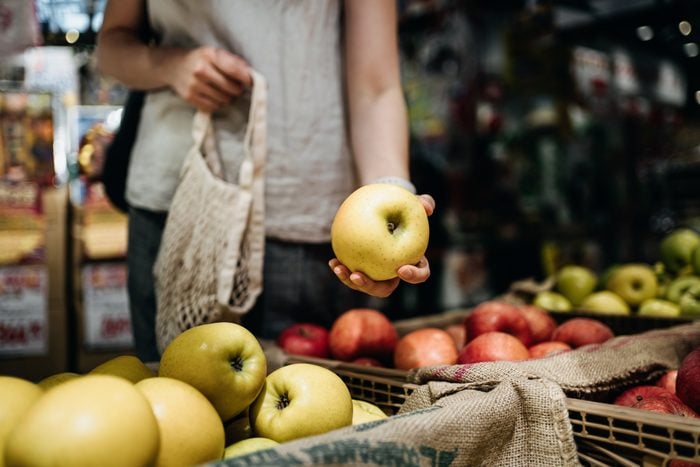
6. Buy whole fruits and veggies
Pre-chopped onions and carrots cost more than buying the veggie and doing it yourself. Yes, it takes a little more time, but it can save you some major money. You may want to avoid oranges, however, due to an orange shortage. Here’s how to store produce to make sure those veggies last too.
7. Go generic
Before you pick up that name-brand condiment, take a look at the store brand version sitting right beside it. These options are typically significantly cheaper and contain the same basic ingredients.
8. Pay attention to unit prices
Figure out the unit price (total cost divided by number of units) to compare deals. “Use this number to compare prices across all stores, including warehouse stores where bigger quantities can be misleading,” Zakaria says. She gives this example: If a 60-count box of granola bars at Costco is $10.29, the unit price would be about 17 cents per bar. That number helps decide how to save money on groceries, because you might be getting a better deal by buying more.
9. Don’t go to the store hungry
This may seem obvious, but research shows that you buy more when you’re hungry (including nonfood items!). If you shop when you’re famished, you’re more susceptible to impulse purchases, which typically mean processed or packaged foods that are more expensive and generally less healthy.
10. Skip the big cart
There’s a reason those grocery carts are getting bigger: If you only need a few items but grab a full-size grocery cart, there’s a good chance you’ll buy more. Start with a basket or mini cart, and don’t upgrade unless you absolutely have to. It’ll save you from spur-of-the-moment purchases you probably don’t need.
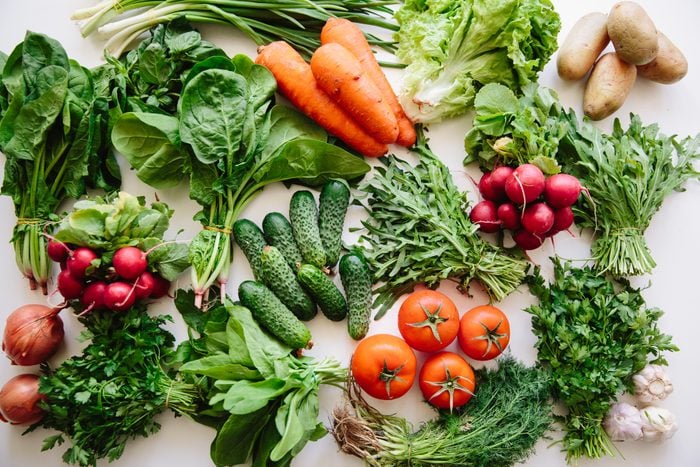
11. Eat what’s in season
This is one simple way to save money on groceries. In-season produce is cheaper because it’s more easily available. It’s also more eco-friendly (and tasty).
12. Avoid delivery when you can
Grocery delivery services often come with additional fees, so from the get-go it’s cheaper to buy groceries in person or order them online for pickup. Here are the cheapest ways to order groceries online.
13. Keep a price list
Keeping track of the prices of your most commonly purchased groceries will allow you to see when you’re getting a good deal and when you’re not. For instance, if you recently paid 99 cents for creamed corn, you’ll know not to buy it when you see it for $1.79.
14. Look at expiration dates on sale items carefully
Foods that are significantly marked down are typically close to their use-by date, so make a plan for using them immediately or else they might go to waste. Those dates are often approximate, so you’ll have some wiggle room, but it’s better not to chance it. Here’s how long milk lasts past its sell-by date.
15. Buy versatile foods
Pantry staples like pasta, rice and potatoes can be used a million different ways, so you won’t get sick of them and toss the leftovers. Starchy basics are also a great way to feel full without breaking the bank.
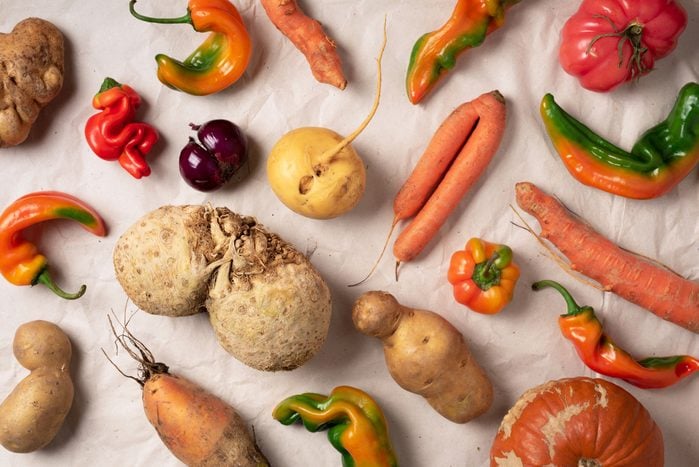
16. Buy ugly produce
Did you know that nearly a third of what’s grown in the U.S. isn’t sold because it’s not quite good-looking enough? Misfits Market rescues that less-than-cute (but still perfectly tasty) tomato from the dumpster and sells it for up to 40% off. It’s organic, sustainable and cost effective.
17. Grate your own cheese
Just as you save money when you don’t buy pre-chopped fruits and veggies, you save money when you buy whole cheese instead of the grated or shredded versions stores sell. Get that grater out at home and voilà!
18. Stop shopping at eye level
We tend to look at items placed at eye level because they’re convenient, and marketers know that, so that’s where the pricier items often end up. Zakaria tells us that more often than not, the better-priced items are placed on the lower shelves. Who knew “look down” could be the answer to how to save money on groceries?
19. Change stores
The store closest to your home might not be the cheapest. Check online or in-store to do some price comparison research and find out what makes sense for your needs. Stores like Walmart, Lidl, Aldi or Costco are typically good bets. Looking for other ways to save? Here’s the cheapest day of the week to do anything.
20. Shop less often
Even at the cheapest grocery stores, more visits means more grocery store spending. Keep your trips down to once a week, if possible. This will also force you to use up ingredients you already have at home. Don’t forget to check out the grocery store with the best reputation.
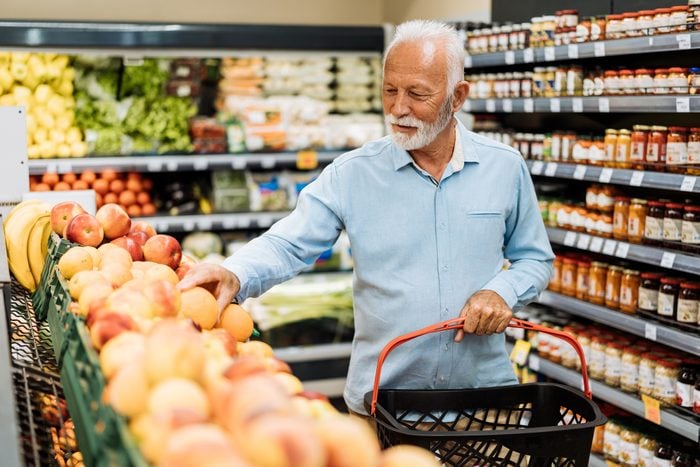
21. Shop alone
When you’re with friends or family, it’s easy to get distracted and pay less attention to what you’re putting in your cart. It’s also easier to spend more time in the store than you need to. Go it alone so you can pay careful attention to your list and stick within your budget. While we’re on the budget topic, here’s how shrinkflation is affecting your grocery budget.
22. Stay away from prepackaged meals
Those frozen options are easy (and pretty delicious), but you’ll pay more for that prepackaged meal than you would if you made it yourself and had some leftovers.
23. Look for cheap sources of protein
When looking for how to save money on groceries, start with your shopping list. Stock up on protein-rich items that give you a lot of bang for your buck like eggs, tofu, peanut butter, lentils and beans. These inexpensive items can replace pricier animal proteins in many dishes.
24. Buy in bulk
Buying items in bulk almost always gives you the best value per item. If you’re shopping for items you can always use (like pasta, cleaning supplies, baking staples, canned goods, toiletries and even pet food), bulk is the way to go. Pick up those items at your local wholesale store. Here are the things even chefs buy at Costco.
25. Check your farmers market
On average, farmers markets are cheaper than your local grocery store. That’s because when farmers sell their goods directly to consumers, they can use lower markups and still make a profit, which means cheaper veggies for you.
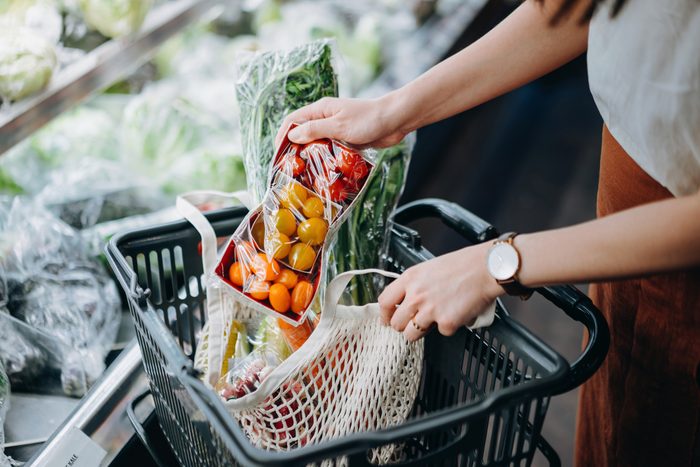
26. Shop at stores with price-matching policies
Comparison shopping is always a good idea, but some major grocery stores like Walmart or Target will actually match prices of their competitors. Be prepared to show proof! Here are some more grocery shopping secrets.
27. Sign up for newsletters
Grocery stores will often give loyal shoppers a heads-up on approaching sales via email newsletters. Sign up and check your inbox before you head to the store.
28. Subscribe and save
It’s no secret that Amazon has a huge variety of items, and many of those are eligible for their “subscribe and save” option. If you’re shopping for something you buy frequently or at regular intervals, this option lets you schedule regular deliveries and earn savings on those items.
29. Get a raincheck
If your grocery store is advertising a product on sale but they’ve run out of that item, ask for a raincheck. They may allow you to still get that sale price when they’ve replenished their stock.
30. Shop surplus
Too Good to Go is an app that connects shoppers with grocery stores, bakeries and restaurants that have a surplus that day. Instead of throwing out those items, these places offer super cheap pickups of “surprise bags” filled with food.

31. Avoid last-minute add-ons
If you’re wondering how to start saving money on groceries, this is maybe the most obvious first step. Stores pack their pay stations with candy bars and other hard-to-pass-up treats because they know they’ll catch your eye while you wait. Stay strong and avoid throwing anything else in your cart while you’re waiting to check out.
32. Don’t be afraid of returns
If you buy something and get home to realize it’s damaged or spoiled, bring it back! There’s no shame in asking for your money back.
33. Watch the register
Cashiers are human, and they can make mistakes when giving you change. Take a moment to make sure you have the correct amount. And while you’re at it …
34. Check your receipts
Sometimes things get scanned twice or price adjustments aren’t made to match sale deals. Make sure you take a look at your receipt to confirm you aren’t being overcharged. Also find out why stores ask for your phone number at checkout before you give it out next time.
35. Buy whole chicken
Buying wings, breasts or legs separately costs more than buying the whole chicken and breaking it down at home.
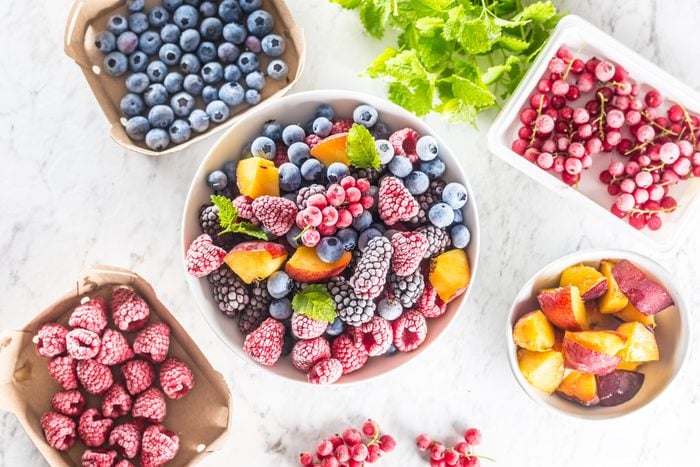
36. Buy frozen produce
Since these fruits and veggies are frozen at prime picking time, you end up getting great quality. Plus, it puts less pressure on you to use those berries or carrots right away, minimizing food waste.
37. Skip bottled water
Switching from bottled water to a water filtration system can save you hundreds of dollars per year. Also, did you know that bottled water expires?
38. Freeze bulk meals
Cooking a big meal and portioning it out is great … but only if you actually eat it all! If you tend to get tired of repeat meals, save a few portions in your freezer so you can enjoy the dish later, when you actually crave it again. Be sure to organize your freezer properly so your meals last (and are easy to find).
39. Join a food co-op
Food co-ops aren’t always cheaper, but they do typically have lower overhead costs. Do some research and see if your local co-op could be a smart budget choice for you. The perks include fresher food and shopping in a more eco-friendly way.
40. Buy less meat
Meat prices have been on a pretty steady rise for a long time. Moving toward a more veggie-centric diet will save you money.
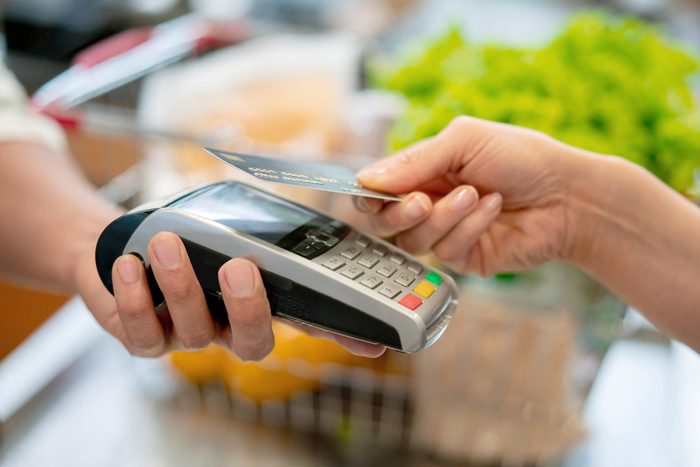
41. Use a credit card that gives you cash back
Cards like Citi Custom Cash will give you up to 5% cash back on groceries, so you’re saving money no matter what you buy. Do some comparison credit card shopping to find a card that’s right for you.
42. Download the Flashfood app
The Flashfood app lets customers know about their local store’s discounted items (products that are close to their sell-by date). For participating stores, you can order through their app and pick up the products at the Flashfood station inside.
43. Skip the drugstore
When you only need one or two items, it can seem easier to just run in and out of your local CVS. The problem is, you’re likely paying extra for that convenience. Here’s a list of things you should try to avoid buying at the drugstore.
44. Follow your favorite brands
It pays to follow your favorite brands on social media. Check their Instagram and Twitter accounts for product news or deals, and sign up for their email lists for special coupons and savings. This is how to get coupons and use them in the most efficient manner.
45. Shop with cash
If you’re trying to stick to spending a specific amount, there’s no better way to do that than shopping with cash. Take the exact amount you need with you to the store. If you’re running over, put something back, don’t charge it!
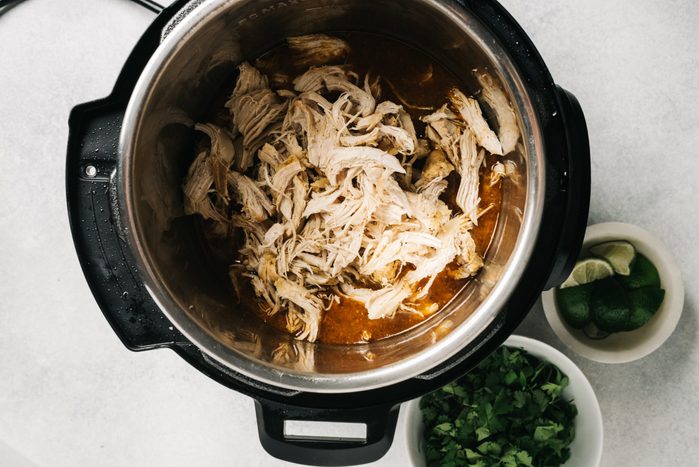
46. Use your slow cooker
There are a few ways your slow cooker saves you money, but one of the biggest is that it allows you to buy cheaper cuts of meat. Tougher pieces like pork shoulder actually work better in a slow cooker.
47. Bring your own bag
Here’s a sustainable tip for how to save money on groceries: Be green and bring your own tote. Many states have implemented a bag tax, or a 5-cent charge to put your groceries in one of the store’s brown paper bags. That might not sound like a lot of money, but it can add up over time.
48. Buy refillable cleaning products
Buying soap refills (sans spray bottle) is cheaper and better for the environment. Simply pick up a glass or plastic one to re-use, then keep decanting your refills into the bottle.
49. Keep inventory on your fridge door
It’s easy to waste food when produce or dairy gets hidden behind other items in your fridge. A good way to fix this is by adding a simple list to the front of your refrigerator as a reminder of what fresh items you have in there that need to be eaten quickly. Every time you open the fridge to grab something, you’ll see it. Fridge organization for the win!
50. Join a buy-sell-swap group on Facebook
Facebook is filled with buying and selling groups, but you can even score some pretty great food deals here! If someone in your area is moving out of their apartment or going on vacation, they may list untouched bags of rice or pasta that neighbors can grab for free.
Next up, find out why most grocery stores don’t have windows.
Sources:
- Gina Zakaria, budget expert at Saving Whiz
- PNAS: “Hunger Promotes Acquisition of Nonfood Objects“
- USDA: “Food Price Outlook, 2022 and 2023″
- USDA: “Official USDA Food Plans: Cost of Food at Home at Three Levels, U.S. Average, October 2022“
- Home Water: “Is It Cheaper to Buy Bottled Water or a Filter“
- Tech Times: “New Google Maps Updates Helps with Grocery Shopping“
